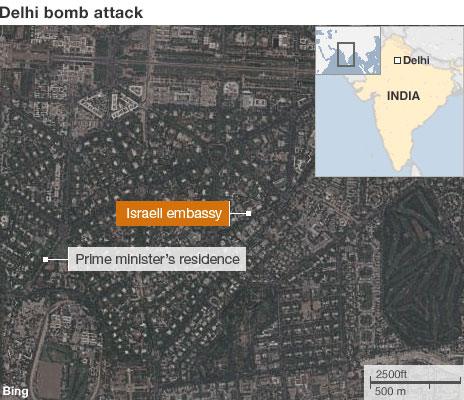Car bombs 'target Israel envoys' in India and Georgia
- Published
Bombers have targeted staff at Israeli embassies in India and Georgia, officials say, with Israel accusing Iran of masterminding the attacks.
Witnesses said a motorcyclist placed a device on an embassy car in Delhi, causing a blast that hurt four people - one seriously. A bomb underneath a diplomat's car in Tbilisi was defused.
Israeli leader Benjamin Netanyahu said Iran was behind both incidents.
But Iranian officials denied the claims as "sheer lies".
One of the victims of the Delhi bombing, the wife of a defence ministry official, was in a "critical but stable" condition, according to AFP news agency. It quoted a doctor as saying she had undergone spinal surgery.
'Terror exporter'
Mr Netanyahu told a meeting of his Likud party MPs that there had been "two attempts of terrorism against innocent civilians".
"Iran is behind these attacks and it is the largest terror exporter in the world," he said.
He also blamed Iran for recent plots to attack Israeli targets in Thailand and Azerbaijan that were prevented.
And he suggested that the militant Islamist Hezbollah movement was also involved.
Israel's foreign ministry said the country had the ability to track down those who carried out the attacks.
But Iranian Foreign Ministry spokesman Ramin Mehmanparast rejected Mr Netanyahu's accusation, calling it "psychological warfare against Iran".
"We condemn any terrorist action and the world knows that Iran is the biggest victim of terrorism," he was quoted as saying by the official Irna news agency.
International condemnation
Earlier, the state's ambassador to India Mehdi Nabizadeh had told Irna: "These accusations are untrue and sheer lies, like previous times."
In a statement, India's Foreign Minister SM Krishna pledged a full investigation, adding: "The culprits will be brought to justice at the earliest."
US Secretary of State Hillary Clinton condemned the attacks, saying the US "stands ready to assist with any investigations of these cowardly actions". UK Foreign Secretary William Hague said he was "shocked and appalled" by the bombings.
The BBC's Rupert Wingfield-Hayes, in Jerusalem, says security at Israeli embassies has been tightened in recent months following warnings of potential attacks, after Iran accused Israel of a series of attacks on its nuclear scientists.
BBC security correspondent Gordon Corera said one of them, Mostafa Ahmadi-Roshan, died last month when motorcyclists placed a "sticky bomb" on his car - a technique similar to that used in previous attacks attributed to the work of Israel's Mossad.
Similarities seen in the Delhi blast could be an indication of the aggressors sending a message that attacks in Tehran will be repaid in kind, he added.
After the explosion in Delhi, Indian TV showed pictures of a burning car near the embassy.
The area around the vehicle was later cordoned off and forensic experts and the bomb squad were examining the burnt out remains.
The embassy is guarded by several layers of security and is in a well-defended area of central Delhi, close to Prime Minister Manmohan Singh's official residence.
'Noticed device'
David Goldfarb, the spokesman for Israel's Delhi embassy, said the diplomat's car was close to the building on Aurangzeb Road when the explosion went off.
He said they had no details as to who was behind the attack.
Officials in Georgia said an explosive device was attached to the bottom of a diplomat's car in the capital, Tbilisi, but was found and defused before it detonated.
Israeli embassy driver Roman Khachaturyan said he had just driven his child to school when he spotted the bomb.
"When I was driving I heard a noise. I got out of the car and saw something stuck to it."

- Published13 February 2012
- Published21 January 2012
- Published11 January 2012